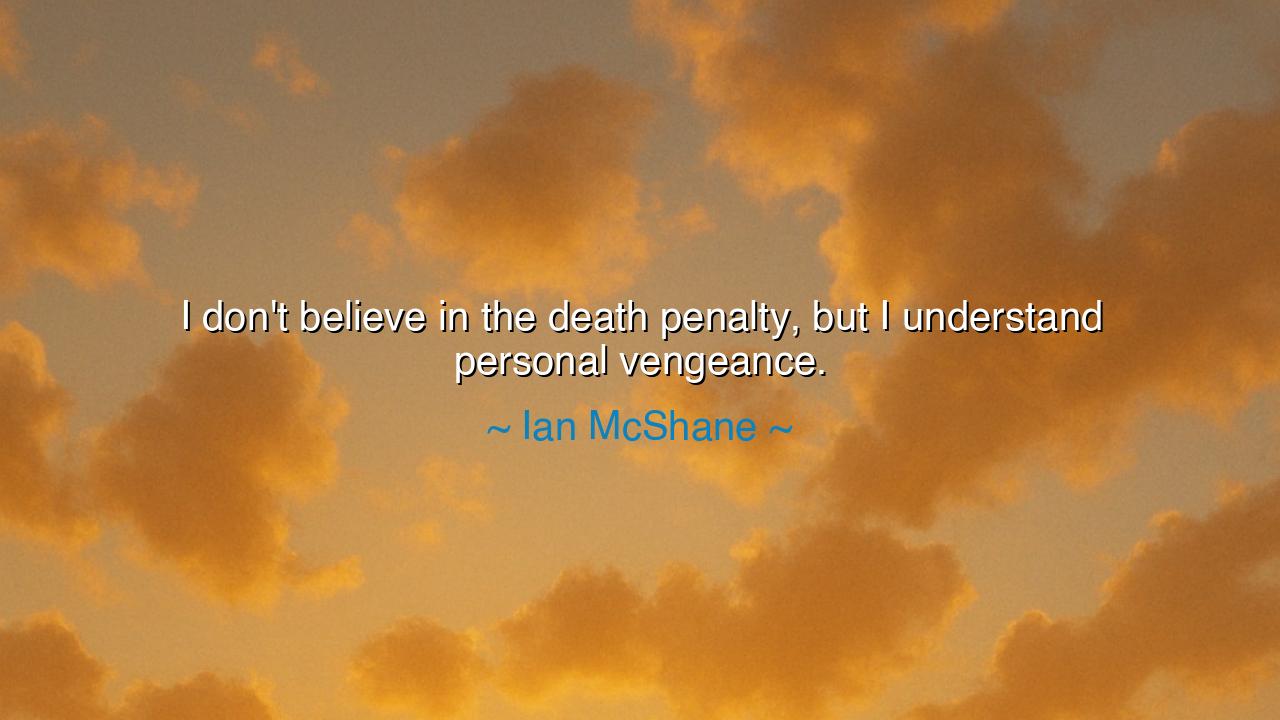
I don't believe in the death penalty, but I understand personal






The words of Ian McShane, when he said, “I don’t believe in the death penalty, but I understand personal vengeance,” carry the tone of a man who has seen the shadow and the light within the human heart. They are not spoken as a moral decree, but as a confession of understanding — a recognition that though justice must be guided by reason, the heart of man still burns with passion. His words echo the eternal tension between law and emotion, between the order of civilization and the chaos of grief. It is a truth as old as time: that the mind may reject vengeance, yet the soul, wounded by loss, may still crave it.
From the dawn of history, the ancients have wrestled with this same paradox. Justice, they said, belongs to the gods, but vengeance belongs to men. In the old myths, the avenging furies rose from the blood of the slain, demanding retribution for every wound. Even in the cradle of philosophy, men struggled to restrain the hand that sought revenge. McShane’s words remind us that this struggle has never ended — that beneath our laws and courts still beats the primal pulse of rage and sorrow, whispering that pain must be repaid. To understand personal vengeance is not to condone it, but to acknowledge that it springs from the deepest ache of the human condition: the longing to restore balance when the heart has been broken.
The death penalty, by contrast, is vengeance made into ritual — the cold, mechanical hand of the state striking in the name of justice. Yet McShane separates the two. He sees that vengeance is human — raw, emotional, and tragic — while the death penalty is impersonal, distant, and final. To endorse the latter is to give bureaucracy the power to kill; to understand the former is to see the wounded soul behind the anger. His words call us to compassion even for those consumed by rage — for he knows that in their fury, they seek not evil, but meaning in their pain.
Consider the tale of Achilles, the greatest warrior of Greece. When his beloved Patroclus was slain by Hector, he burned with such wrath that he abandoned all mercy. He hunted Hector down, slew him in battle, and dragged his body behind his chariot in rage. Yet when the father of Hector came, humble and grieving, to beg for his son’s body, Achilles wept. For in that moment, vengeance lost its hold, and he saw the shared sorrow that binds all men. The gods themselves were silent, for they knew Achilles had touched a deeper truth — that vengeance satisfies the wound of pride, but not the wound of love.
McShane’s insight lies in this same wisdom. He does not believe in the death penalty, for he knows it cannot heal what has been broken. It does not restore the lost, nor cleanse the heart. Yet he understands personal vengeance, because it is born of love twisted by suffering — a love so deep that it cannot bear the sight of injustice unanswered. His words, therefore, are not cynical but profoundly humane. They remind us that empathy must extend not only to victims, but also to those who, in their grief, lose sight of reason.
There is a lesson here for all who walk the path of righteousness: to acknowledge the fire within, yet not let it consume. The ancients taught that virtue lies not in denying anger, but in mastering it — transforming the will to harm into the will to heal. When wronged, do not feed the hunger for revenge, for it will eat away your peace. Instead, seek justice through understanding, and vengeance through creation — let the energy of your pain become the seed of something noble.
So let the listener take this teaching to heart. When you are wounded by betrayal or loss, remember that to feel vengeance is human, but to choose mercy is divine. Do not condemn the one who rages — reach instead for their hand, for they are lost in a storm they did not summon. The world does not need more death to balance death; it needs more hearts that can look upon pain and still say, I will not answer darkness with darkness. For as Ian McShane reminds us, justice may be written in law, but understanding — that most ancient of virtues — is written in the soul.
And thus, may we learn to hold both truths in harmony: to see vengeance without surrendering to it, to reject cruelty without denying compassion. For the measure of wisdom is not in never feeling anger, but in rising above it — transforming the fire of pain into the light of forgiveness, and the cry for retribution into the song of peace.






AAdministratorAdministrator
Welcome, honored guests. Please leave a comment, we will respond soon